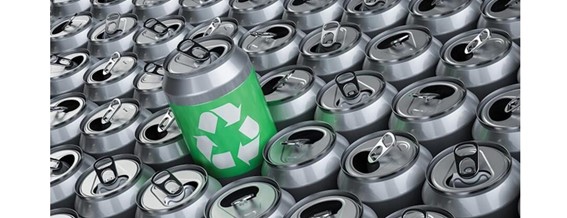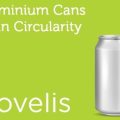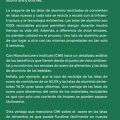Aluminum can recycling worldwide
Although aluminum can recycling has increased in recent years, there is still much work to be done. In this article, we will tell you which are the main countries that recycle this material and which are the best ways to recycle aluminum cans.
The history of aluminum can recycling
Since aluminum cans were invented, recycling has been an integral part of their history. The first step was the recovery of the metal for reuse. This became possible in the middle of the 20th century, when the aluminum can recycling process was invented. Since then, recycling has become a multi-billion dollar industry that helps reduce the environmental impact of aluminum cans.
The first place in the world to adopt aluminum can recycling at the national level was Switzerland. In 1959, the Swiss Foundation for Metal Recycling (FUS) was created to coordinate the national effort to recover and reuse metal. The program was an immediate success, and within a short time the country was recycling 85% of all aluminum cans produced.
The success of the Swiss program inspired other countries to adopt aluminum can recycling. By the mid-1970s, the United States, Germany and Japan were recycling 50% or more of their aluminum cans. In the 1980s, the United Kingdom and Canada also joined the list.
Globally, about 60 billion (60 billion) aluminum cans are recycled each year. This equates to a reduction in environmental impact equivalent to taking 8 million cars off the road.
What is aluminum can recycling?
Aluminum can recycling is the process by which aluminum cans are recovered for reuse. Recycling aluminum cans saves energy and reduces CO2 emissions. It is also a way to prevent cans from ending up in landfills, where they could cause environmental damage.
To recycle aluminum cans, different methods can be used. One of them is shredding, in which cans are crushed and mixed with other materials to form a new product. Another option is melting, in which the cans are melted down and reused to make new cans or other objects.
Aluminum can recycling is an efficient and cost-effective process.
Why is it important to recycle aluminum cans?
Did you know that recycling an aluminum can can save enough energy to keep a light bulb on for 3 hours? Or that it takes 4 aluminum cans to make a new can from recycled metal.
Aluminum is a 100% recyclable material and can be recycled over and over again without losing its quality. In fact, 75% of all aluminum ever produced is still usable today.
Recycling aluminum cans is important because:
-Reduces the amount of waste in landfills
-Saves energy (it takes much less energy to melt down recycled metal than virgin metal)
-Reduces CO2 emissions (smelters emit many tons of CO2 each year).
-It is a way to prevent the cans from ending up in landfills, where they could cause environmental damage.
How are aluminum cans recycled?
Aluminum cans are easily and efficiently recycled. 75% of the aluminum cans produced are recycled and can be reused over and over again. Aluminum cans are recycled in a three-step process. In the first stage, the cans are compacted and then melted to create an ingot. The ingot is then sent to a mill where it is converted into new cans. The entire recycling process only takes about 60 days.
The benefits of aluminum can recycling
Recycling aluminum cans has numerous environmental and economic benefits.
From an environmental point of view, aluminum can recycling contributes to the reduction of air and water pollution, as well as to the conservation of natural resources. It is estimated that if all the aluminum cans produced annually in the world were recycled, emissions equivalent to 8 million tons of carbon dioxide would be avoided.
In addition, aluminum can recycling is a relatively efficient process, as about 100 cans can be recycled with the energy consumption equivalent to only 1 liter of fuel.
Finally, recycling aluminum cans also has economic benefits, as it saves energy and raw materials, as well as reducing waste management costs.
What is done with recycled aluminum cans?
Many aluminum cans are recycled into new cans or into building materials. Other aluminum cans are used to create new products, such as aluminum foil or roof tiles.
Alternatives to aluminum can recycling
Aluminum cans are one of the most recycled products worldwide. It is estimated that more than 75% of the aluminum cans produced are recycled. However, aluminum can recycling is not the only option to reduce the environmental impact of these products.
An alternative to aluminum can recycling is thermal recycling. In this process, aluminum cans are crushed and mixed with other materials to create a new material called “alumina”. Alumina can be used as a replacement for cement and other materials used in construction. It can also be used to manufacture paper and other products.
Another alternative is the reuse of aluminum cans. Aluminum cans can be washed and reused for packaging other products. They can also be used to make DIY items, such as flower pots or toys.
Conclusions
Since industrialization began, aluminum can recycling has become an integral part of conserving our environment. This represents a significant saving of energy and raw materials, since it avoids having to extract and melt the metal again.
In general, the recycling process is relatively simple and requires little specialized equipment. The cans are compacted and then melted to create solid metal blocks called ingots. These ingots are used to manufacture new cans, as well as other products such as parts for automobiles or household appliances.
Although recycling aluminum cans is a great step forward in protecting the environment, there is still a lot of waste that is not recycled.
Since the beginning of the recycling industry, aluminum has become one of the main products to be recycled. Globally, about 75% of all aluminum produced is recycled. This is because aluminum is a very valuable material that can be recycled over and over again without losing its quality.
Recycling aluminum cans has many benefits. On the one hand, it reduces the amount of waste going to landfills. In addition, it also helps to conserve natural resources as much less energy is needed to produce aluminum cans from recycled materials.
Finally, recycling aluminum cans is also a very efficient way to generate electricity. In fact, it is estimated that recycling a single aluminum can can can generate enough energy to keep a fluorescent bulb lit for three hours.















